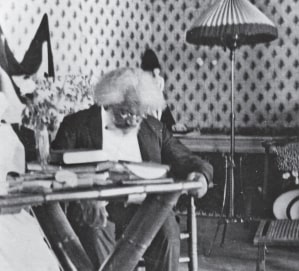This year marks 200 years since the birth of Frederick Douglass, as Frederick Augustus Washington Bailey, and 180 years since he escaped bondage to become a social reformer and abolitionist leader. Douglass chose to celebrate his birth on Feb. 14, just as he chose the surname Douglass.
While his books and speeches are world-renowned, as is his influence on President Lincoln’s timeline for emancipation, local historian John Muller argues that Douglass’s contributions to local Washington are forgotten.
“Douglass was the equivalent of an ANC commissioner,” Muller said in an interview at the Street Sense Media office. “He was comfortable in the presence of peasants as well as presidents. The same battles that people fight with local government today, he fought then.”
Muller, a journalist and local historian who grew up in the region, has been fascinated by Douglass since stumbling across his 1845 autobiography in the seventh grade. He distinctly remembers reading a passage about how Douglass would trade bread to poor White kids in exchange for words, teaching himself to read. It was a stark comparison for a young schoolboy.
“Frederick Douglass in Washington D.C.” was published by Muller in 2012 with The History Press. He published a similar chronicle of Mark Twain’s life in D.C. the following year.
The rest of the interview has been edited and condensed for space and clarity:
Street Sense Media: You contacted us along with other media outlets to say the Frederick Douglass bicentennial deserves more local recognition. Why?
Muller: In the popular narrative of the life of Frederick Douglass that prevails in the public consciousness, and that has been advanced by historians, there is an inattention to Douglass’s life as a radical journalist. The bicentennial celebrations across the country have largely ignored Douglass as an editor and newspaperman.
In the mythologizing, the hero worshipping, the details and intricacies of his everyday life are lost. If you visit his home in Anacostia, a national historic site, the staff can tell you where he grew up on the Eastern Shore or about his visits with Lincoln. But his life in the local neighborhood is less emphasized.
Douglass came here [from Rochester, New York] to start The New National Era, with the encouragement of his children, who were already here. Charles Douglass lived in Barry Farm and taught night school in Hillsdale, an older name for the Barry Farm neighborhood.
The journalism business was, in a way, the Douglass family business. His children assisted with The North Star. Lewis Douglass worked on the New National Era, as did Frederick Jr. It’s a story not often told.
Street Sense Media: Tell us more about his journalism career.
Muller: The minimizing of the story of Douglass as a journalist largely ignores the context of his first meeting with President Lincoln. Lincoln says “‘Mr. Douglass, I’m familiar with your work.’” Lincoln’s Secretary of State, William Seward, reportedly had shown President Lincoln copies of Douglass’ editorials and newspaper work.
When Douglass published his autobiography in 1845, he basically incriminated himself because he’s a fugitive slave. He goes to Europe and is a lecturer in Ireland, Scotland, England. There, British abolitionists raise money for him to come back to the United States and launch a newspaper.
He moves to Rochester and launches the North Star in 1847. It was not the first newspaper edited and published by an African American. But Douglass raised the standard. In D.C. He was the first Black capital correspondent to be admitted to the Congressional press gallery. In 2007, a plaque was placed in the Capitol to honor Douglass as the first Black congressional correspondent. Douglass elevated what a Black newspaper was, he elevated what an abolitionist newspaper was. The North Star had a couple mergers, name changes, etcetera — ending as Frederick Douglass’s Monthly. He was a newspaperman in Rochester for 16 years.
Street Sense Media: And that brings us back to The New National Era?
Muller: Yes. Douglass names his D.C. paper as a nod to The National Era, a local pre-Civil War abolitionist paper that published the writings of Harriet Beecher Stowe, who’s most known for “Uncle Tom’s Cabin.” At that time, D.C. was a pro-slavery city, but had this anti-slavery paper because you had anti-slavery congressmen and senators. So, in that capacity, Douglass was a historian of local journalism. He understood the consequence of what he was doing, the history that he was making every week [he put out a paper].
The New National Era chronicled the first generation of Black congressmen and senators that entered the halls of Congress during Reconstruction. But it also highlighted Black-owned and Black-serving businesses and built notoriety for noteworthy community members and organizations. He participated in and published about the equivalent of the statehood movement of the time: The District Suffrage Association. Because his paper covered both local and national issues, it was read on the Hill and literally read into the Congressional Record.
I think it is also critical to understand that when Douglass is in Washington, he’s not this singular journalist. His office was blocks away from Newspaper Row, which was right off 14th and Pennsylvania Avenue where the National Press Club is today. It’s famous in terms of there was a lot of debauchery, a lot of bohemians, just the culture of these radical journalists. So he exists in that local context, like the City Paper, The Informer and the Post today. Douglass was friends with Emily Edson Briggs, Grace Greenwood, Kate Field, George Alfred Townsend, who in his own day was equal to Mark Twain, though he’s now kind of been forgotten.
Even after he closed The New National Era in 1874, Douglass was a constant mentor to journalists: George Washington Williams, William Calvin Chase of the Washington Bee, John W. Cromwell of the People’s Advocate. He informally served as as editor emeritus of the Black press.
Street Sense Media: What other contributions did he make to our community?
Muller: Well, there are certain dynamics to being a journalist and editor. It’s a very unique calling, it’s a very unique community role to play. And he always walked to his office downtown, from Cedar Hill in Anacostia. And he was always talking to folks, so he was very visible.
He also made his home a safe place where students, activists, and artists — all — were welcome. He supported community theater and hosted “reading salons” to educate and host debates on what today could be called ‘social justice issues.’ There are archives where people talked about playing baseball at his house when they were kids. Who were they playing with? Probably Douglass.
Street Sense Media: Why do you think this side of Douglass is less well-known?
Muller: Just look at the lack of original trustworthy scholarship. There’s no comparison between the research that has been done on a figure like Lincoln, or even Mark Twain. Ford’s theater is around the corner, think of that stack of books. That doesn’t exist for Douglass. [The Lincoln Book Tower stands 34 feet high and is symbolic of the more than 15,000 books that have been published about Abraham Lincoln, according to the Ford’s Theatre website.]
He’s been conferred honorary degrees [posthumously] and his name has been affixed to many streets, recreation centers, libraries, universities and even commands a book prize for books not about Douglass. But where is the genuine academic interest? It’s like a bad Chris Rock joke.
Street Sense Media: Outside of local media, what other institutions could improve their recognition of Douglass’s bicentennial?
Muller: In 2014, Congresswoman Norton introduced a bill to establish a Bicentennial Commission, which took a number of years to become law. Unfortunately the commission hasn’t really started; it’s my understanding they have not yet met. Moving forward there are a number of programs and celebrations planned for fall and the upcoming February. Over the past six months I’ve been working closely with members of the Douglass Family and Bailey Tribe to recover the lost history of Douglass on the Eastern Shore. We’re hoping to publish a new book within the next year. There’s just a lot of work to do. It will take years, if not generations.
In addition to his book “Frederick Douglass in Washington, D.C.: The Lion of Anacostia,” more of John Muller’s research is available at http://thelionofanacostia.wordpress.com.








